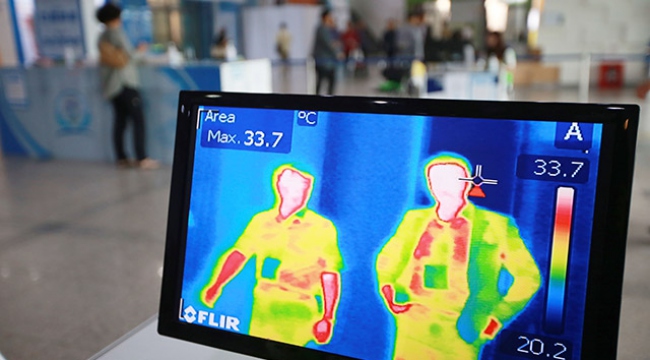- California Assembly OKs highest minimum wage in nation
- S. Korea unveils first graphic cigarette warnings
- US joins with South Korea, Japan in bid to deter North Korea
- LPGA golfer Chun In-gee finally back in action
- S. Korea won’t be top seed in final World Cup qualification round
- US men’s soccer misses 2nd straight Olympics
- US back on track in qualifying with 4-0 win over Guatemala
- High-intensity workout injuries spawn cottage industry
- CDC expands range of Zika mosquitoes into parts of Northeast
- Who knew? ‘The Walking Dead’ is helping families connect
Alert issued for Hong Kong flu in S. Korea

A thermal camera monitor shows the body temperature of visitors during the Job Fairs in Seoul, South Korea Friday, June 5, 2015. Now the Korean government has been put on alert over the possible spread of the seasonal flu, which killed 61 people in Hong Kong last month alone. (Yonhap)
By Jung Min-ho
Fresh concern is arising over the possible spread of an influenza virus as the nation has yet to emerge from the shock of an outbreak of Middle East Respiratory Syndrome (MERS).
The Korean government has been put on alert over the possible spread of the seasonal flu, which killed 61 people in Hong Kong last month alone.
After a Korean man contracted the virus after visiting Hong Kong, concerns are growing over the flu coming to Korea.
According to the Korea Center for Disease Control and Prevention (KCDC) Friday, the H3N2 influenza strain is highly infectious and potentially deadly.
“We’ll strengthen fever checks for those coming to Korea from Hong Kong through Incheon International Airport, and those showing symptoms of the flu will undergo tests,” a KCDC official said.
“If tested positive, such people will be advised to visit hospitals as soon as possible and avoid outdoor activities.”
But the agency does not have any plan to implement quarantine measures against the virus. “It is extremely rare for any country to take such measures against seasonal flu,” the official said.
The H3N2 virus, better known as Hong Kong flu, has killed over 500 people in Hong Kong since the start of the year.
On Thursday, the Ministry of Foreign Affairs issued a travel advisory for Hong Kong, urging travelers to be cautious of the risk.
“Koreans who plan to visit Hong Kong or reside there have been advised to maintain hygiene and take extra care to stay healthy,” a ministry official said.
The KCDC and the ministry will continue to monitor the situation to see if additional measures are needed, sharing information about the situation with Hong Kong’s health authorities.
Korea and Hong Kong are closely connected, with about 300,000 monthly travelers between the two. So concerns have been rising over the flu. Some worry that it will become more damaging than the MERS virus, given its high infection rate.
In fact, the number of deaths from flu already outnumbered the 302 deaths from the Severe Acute Respiratory Syndrome (SARS) outbreak in 2003.
The H3N2 strain of flu, however, despite the large number of deaths, is not considered as threatening as SARS because nearly all the victims have been the elderly or the sick, with low immunity, according to the KCDC.
Yet, with the broken public trust in the government disease control system throughout the MERS outbreak, concerns are likely to remain.

















Pingback: Airport Hotel In Hong Kong International | Hotel
Pingback: Bluecross Health Insurance Hong Kong | Care Insurance